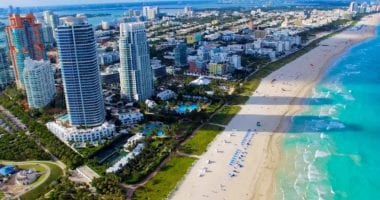FL Sports Betting Bolstered by Bill That Includes Seminoles, Race Tracks

For roughly the next 60 days, millions of sun-seeking tourists and COVID-confined college students will sprawl themselves over Florida’s beaches and barstools, eventually leaving their cash, odd flip-flops and occasionally their dignity behind.
Over the same period, beginning on Tuesday, March 2, the Florida Legislature commenced its succinct annual session with budgetary matters – specifically a $2.5 billion shortfall – key among pressing issues. And nestled among the myriad of ways various legislators hope to address that shortfall is yet another attempt to bring legal Florida sports betting to the state of 21 million that Republican Gov. Ron DeSantis has proclaimed he wants to turn into a sports tourism powerhouse.
After DeSantis rejected the outlines of a last-ditch attempt at a deal with the Seminole Tribe of Florida in 2020, sources in Tallahassee put the onus squarely on him.
This session could therefore go far in determining whether those spring breakers, seasonal residents and tourists leave millions in taxable sports betting reve
nue behind, too.
Late sports betting bill sparks interest in Florida
Every year – including this year – sports betting bills are introduced and the cause evangelized by the likes of State Sen. Jeff Brandes and former Senate President Bill Galvano, but Florida’s disparate political population and the legislature that reflects it has assured the state remains nothing more than a tantalizing prospect.
But this year, HB 1317, HB 1321 and HB1319, filed by House Republican Chip LaMarca and Democratic Rep. Anika Omphroy on Feb. 25, with their potential to alleviate a massive budget crunch and the inclusion of the most crucial stakeholders in the Seminole Tribe, could finally make sports betting in Florida low-hanging citrus fruit.
State-wide observers are typically cynical, but intrigued.
The LaMarca bill also refutes that Amendment 3, a voter-approved impediment to the expansion of casino gambling passed in 2018, applies to sports betting.
“As we grapple with a tough budget year and as many good programs are facing deep cuts, it’s time Florida gets innovative when it comes to keeping dollars in our state,” LaMarca told Florida Politics. “Right now, Floridians are sending millions of dollars out of the state every year, mostly overseas to foreign countries, because Florida has failed to bring legal sports wagering to our state. We have an opportunity to keep that money here in Florida. Allowing online and retail sports betting to operate legally translates into millions in revenue. That’s money from Floridians that should be invested in Florida.”
Of all of the arguments re: legalizing sports betting that I have seen and heard made in state capitals, the most effective – by far – is “We can’t let [OTHER STATE OR COUNTRY] take our money”.
Interesting to see the “tourist” revenue capture angle woven into this one. https://t.co/2pEI0D0xVm
— Chris Grove (@OPReport) February 26, 2021
Sports betting would be overseen by the Division of Pari-mutuel Wagering of the Department of Business and Professional Regulation. Licensing fees would be $7.5 million initially with a $1 million yearly renewal. The tax rate is 22.5%.
While the push for sports betting in Florida hasn’t been buttressed by a cadre of professional team owners (such as in the coveted prize of Texas), Tampa Bay Lightning owner Jeffrey Vinik is supportive if the enterprise is instituted “responsibly,” a spokesperson told Playin USA.
According to HB1317, sports betting licenses may be issued to:
- A pari-mutuel facility licensed by the Department of Business and Professional Regulation.
- An existing tribal organization casino property.
- A professional sports venue.
Crucially, this could placate both the pari-mutuel and Seminole camps. Revisiting the Compact that gives the Seminole Tribe of Florida – which runs six state casinos, two through Hard Rock International, which it owns – would likely still be required. But Seminole Gaming chairman Jim Allen signaled a potential willingness to deal in a recent interview with CDC Gaming Reports. The Seminoles in 2019 ceased $350 million-yearly revenue-share payments to the state because Florida officials, they claimed, are allowing race tracks to illegally conduct the type of “banked” card games they believe are part of their virtual monopoly on casino-style gambling there.
“We feel the state may be interested in working with us to reinstitute our revenue share and if that is the mindset of the state, we’re happy to sit down and discuss it,” Allen told CDC Gaming Reports. “We’ve always had a good relationship (with Florida) in my 20 years.”
Professional sports venues could be sportsbooks in Florida
According to HB317: “Professional sports venue” means a permanent physical location that houses a full-time professional sports franchise or a recurring annual event of the National Football League, Major League Baseball, the PGA Tour, the Professional Golfers’ Association of America, the Ladies Professional Golf Association, the National Hockey League, Major League Soccer, the National Basketball Association, the Women’s National Basketball Association, the Indoor Football League, the National Lacrosse League or Major League Lacrosse.”
That wording would shut out a monied and influential state ally in NASCAR, which could turn Daytona International Speedway into the nation’s largest sportsbook. NASCAR and its teams are increasingly embracing sports betting as an engagement tool and revenue stream.
The law would allow for venue operators to offer in-person wagering and through mobile or online. With many sports arenas in Florida owned by the public, its unclear how their jurisdictions would facilitate the process. Betting kiosks have been reported as a possibility at Soldier Field in Chicago, however, which is owned by the city park district. DIS is among the handful of privately held venues whose owners seemingly would be interested in offering sports betting.
BB&T Center (Panthers) is owned by team principal Vinnie Viola and Hard Rock Stadium (Dolphins) by team owner Stephen Ross.
Though he would not be in a position to set up a sportsbook at Amalie Arena, Vinik supports legalizing sports betting in Florida. A Lightning spokesperson told Playin USA that Vinik is “in favor of legalizing sports betting in Florida as long as it can be done in a responsible manner.”










